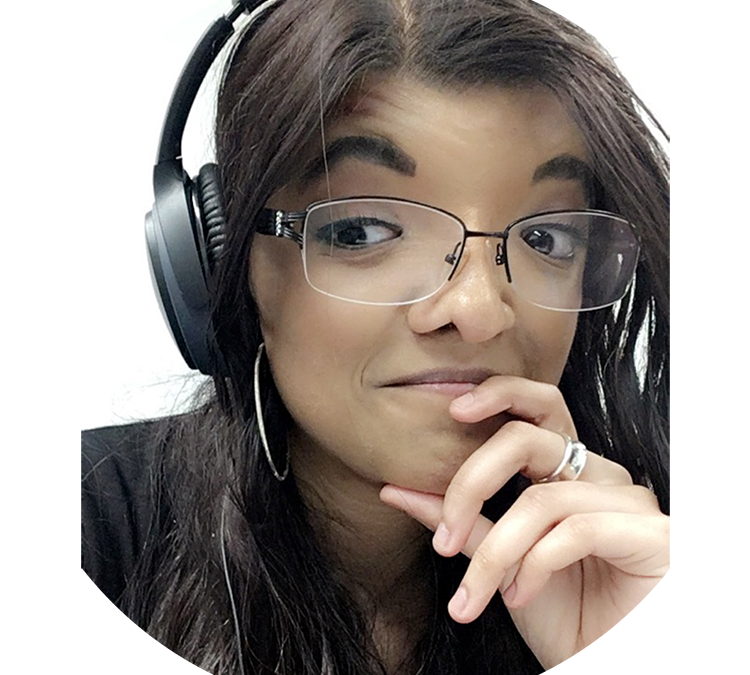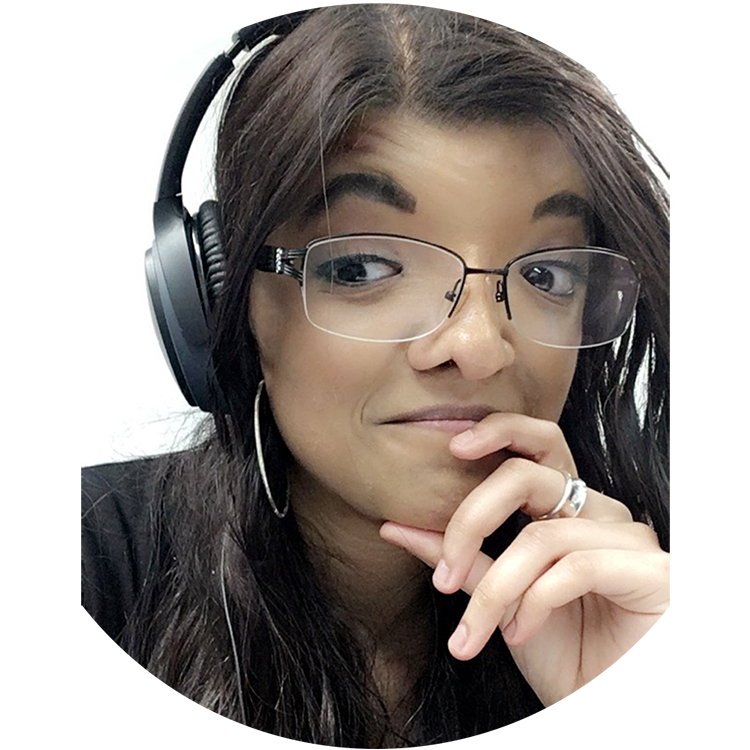
Sarisha Prasad
Sarisha Prasad is in her last semester in the Bachelor of Psychology program at Capilano University. She entered post-secondary in general studies, then after taking first year psychology, discovered her passion for helping youth that have been on a similar health journey to her own.
Throughout my life, I have dealt with health issues from craniofacial surgeries from birth to chronic seizures in my twenties, and still maintained progress in my education and extracurricular activities. During these hardships, I have faced a lot of bullying and adversity. I did not have a lot of knowledge of or access to counselling and therapy growing up, so much of my knowledge of mental health, strength and confidence came from my own struggles with them. I started volunteering with children, babysitting in high school, then in the last three years in Girl Guides of Canada for more experience in youth support.
In the next ten years, I plan on developing connections with more working therapists such as Dr. Janet Waters, who worked in clinical therapy; and Dr. Justin Wilson, who works in anger management, to seek an internship to prepare and practice for a career in counselling. I hope to return to post-secondary and complete a Master of Arts in Counselling at the University of British Columbia, and achieve a career working in counselling and therapy with youth. I wish to be there for other youth going through the struggles that I did, and to provide the support and resources that I did not have growing up.
In my third year in my Bachelor of Psychology program, I took a course specifically on clinical psychology and therapy from Dr. Janet Waters, a working therapist, and learned crucial content and methods that I have kept with me and plan to use in my career. I also completed a course on theories of personality with Dr. Waters that deeply helped me in terms of my own mental health and personality.
I will create a comfortable, supportive and encouraging counselling space for my clients, and endeavor to welcome any and all to my practice. Growing up, I never liked feeling judged or bullied by anyone, when it came to sharing any issues and struggles that I was having. I am striving to be understanding, open and supportive when it comes to anyone who is in need of support. I believe it is possible to bring positivity to everyone.
Introduction
If there’s anything I have always appreciated at any point in my life, it is music. If there’s anything that I’ve always carried with me, it is a pair of headphones, and any device that can play music. Listening to music has always made me feel better. I have always loved when any public location has music playing in the background, watching live performances and attending concerts. When polynesian dance became a passion at ten years old it brought even more appreciation for music into my life, and I learned quite a lot about the culture. Both instrumental or with lyrics, several genres, music has always captivated me. I have always felt more relaxed, happy and collected around music. In the past six years of my life, my love for music has only grown, become so much stronger. I’ve connected and bonded with so many amazing people because of our love of music, I’ve learned so much in many different ways. I never used to know music could be a form of therapy that is not on the medical, more chemical side and now I appreciate it so much and believe it should be tried first until medication is absolutely necessary.
How it All Began
Throughout my life I have always found myself to be one to get stressed out, anxious or overwhelmed easily. From a young age, I grew up going through a number of surgeries, looking different from others, comparing myself to everyone and being bullied. I dreaded going to school. I constantly had so much going through my mind at any given moment and time. One thing that would help me relax, take my mind off of my stress was music. I never had any lessons playing a musical instrument, but I would take any chance I had to listen to music. Whether it was my bedroom CD player, the stereo in our family truck, my mp3 player, my mother’s first ipod, I felt great sitting and listening or getting up and dancing to music at any time of the day. One day while I was in elementary school, on the way to school, I was in the back seat taking turns with my sister requesting songs for our mom to turn on, I noticed that in a way it took over my mind, put me in a better mood and got me ready for the day in a positive way instead of just bracing myself. I decided that that was how I wanted the morning trips to be like. Collecting CDs became a hobby as I would always have another one to turn on. I was not exposed to the idea of therapy when I was young. The school I attended at the time I was being bullied did not have counselors to help in those situations and my family did not know I needed it as I never talked to many people about what I was going through mentally. I am grateful that somehow I found my own, I always knew what would make me feel better and it would always be there. To this day, dealing with some new physical health struggles while being in post secondary, I always keep a device that plays music near me and feel a lot more comfortable and relaxed. On the way to my most recent hospital stay, I was so nervous I was shaking and felt so suffocated. I had my headphones on playing music so loud I could not hear anything else around me, playing all of my favorite songs and new ones, paying attention to learning lyrics rather than what I was about to walk into. I have made a note to myself to use this method when I know an event that will cause me strong anxiety is coming up, and it has helped tremendously ever since.
Many studies have been conducted to look into and show how music and music therapy are effective and beneficial to one’s mental health. There are several styles of music, various genres, described as similar to different personality traits in humans. It is said these different styles of music can bring out different emotions in humans, and that some styles of music can bring out a variety of positive emotions in humans (Zheng & Lam, 2022). The variety and differences in the styles and genres in music have always been fascinating to me. I have found that music that is more fast paced, loud, and less emotional does bring more joy and happiness to me. It is this style of music that makes me, as well as several others I know, want to stand up and dance with each other. Having an appreciation for music can also promote one’s mental health and lessen their negative emotions (Wang et al., 2022). Knowing several musicians in my life, many people have shared their passion and appreciation for music with me. When listening to music with them, or seeing a concert together, I can see they feel less stressed out or overwhelmed and they are in a better state of mind and feeling quite positive. Back in twenty sixteen I attended a Coldplay concert with two friends. Despite all being in school and having work to do, we spent the whole show not worried, on our feet, dancing and singing along and laughing. It was a memorable night. Going to concerts with friends will always be one of my favorite activities knowing that we will all be in a positive state of mind and feel positively emotional.
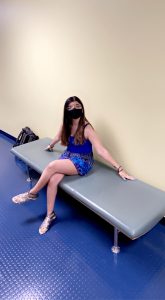
The first place I went when students were allowed back on campus after COVID-19, “Sarisha’s Bench”. We went on to expand it with another.
Jazz Family
Six years ago, I had just declared my major in psychology at Capilano University but my circle of friends began in the school’s jazz studies program. I went from knowing only two students in the program to building connections with other students that were their friends, even some of the professors. I found these students so open and social, inviting me to their performances and to watching them practice their instruments when they were not in classes. As time was going on I felt like I was becoming more and more a part of their community and building such strong friendships. One of my classes that caused me a lot of stress and anxiety was my statistics class. The day I had my mid-term for the class I came to school so stressed out and nervous. The exam was in the afternoon. A group of friends that were in an ensemble class earlier in the day brought me in and had me sit in their rehearsal class and just listen to help me relax and calm my nerves. I loved listening to the music and just watching my friends playing was incredible. Their talent was fascinating. My mind was taken off of the stress and worry about the test and grades. Before I had to leave to go write my exam I gave all of my friends hugs, grateful for their support and felt much more calm and prepared to go to my class. These talented musicians had known how to help me, and were such good friends to me. I felt so connected to them. It became normal for me to regularly sit in on many rehearsals when I was not in class, the professors even let me sit in on lectures with my friends. Another strong memory was a day I had a medical emergency in the halls of the jazz program floor on campus. The last memory I had was just checking my bag alone on a bench in the hallways. I had fallen unconscious. When I came to, a friend, a trumpet player, was holding me seated, and was telling me what she had seen and asking a friend, another trumpet player, to get some water for me to drink. I was humiliated, stressed, but the circle of friends I had around me were all reassuring me that everything was alright and they did not see anything wrong with me. They were there to help me because that is what friends are for. They brought me into the classroom that they were practicing in for more privacy. The other students in the room started playing their instruments softly and some came to help me. I got emotional. Ever since I have been so grateful to have these friends and the community of the jazz studies program around me. I began referring to them all as my jazz family, despite not being in the program I feel like they are family, they look out for me, they keep me safe. It became normal for me to just hang out and relax on the bench in the hallway of the jazz program. Whether it was to just wait for my next class, work on my homework or just to relax and recuperate while listening to the wonderful music being played around me by my friends in their classes. My friend’s know where to find me and keep an eye on me as they know I have some health struggles. Two years ago, a professor who was the department head said that the bench should be referred to as “Sarisha’s Bench”. It makes me so happy that all of my friends in the jazz studies program call the bench by the same name, and are always there for me when I am struggling. I do believe that the friendships I have made in the program are some of my strongest relationships in my life.
It is believed that music can be beneficial to relationships and help build connections and make them stronger. I have found that most of my strongest friendships that I have made in the past five to six years have been surrounded by music and I feel that music is what has helped build the connections. “Through witnessing the performances of others, audience members developed new narratives about the potential within others, which sparked new interactions and possibilities within relationships” (Mitchell, 2021). This study shares that watching people perform live music, people in the audience build new connections and relationships. This closely mirrors my life becoming friends with the jazz program. Watching all of their performances. Not only did I become friends with those performing, I became friends with the other students in the program that would be watching with me or sitting next to in the lectures. Many studies have been conducted to share that music is therapeutic and beneficial as “Music maintains mental health by promoting harmonious interpersonal relationships” (Wang et al., 2022). My psychology professor at Capilano university Dr.Douglas Alards-Tomalin has been supportive to me while I have been struggling with my mental and physical health. He is musically talented and plays instruments himself. He has seen me become close with members of the jazz studies program at school when also teaching some students as well as enjoying the hallways of the program listening, we call the space “The Happy Hallway”. He believes that my becoming friends with students in the jazz program has been beneficial to me and my mental health. When I spoke with him he said “I think having a good solid social group that’s really supportive is really important for working through any kind of challenge that you have in your life. I’m so stoked and, and so happy that the music students are able to, you know what I mean, that they have that, um, that they’re so open and, and inclusive and that, that they’re willing to, you know, reach out and, and take care of each other and, and that they, they have that kind of community. And, and part of me thinks like maybe music does kind of build that kind of connection between people” (D. Alards-Tomalin, personal communication, March 13, 2023). Many professors from the jazz program as well as my psychology program have seen how the friends I have made have been supportive and help keep me positive, relaxed and try to give the best and most fun days I can have, always encouraging me to listen to the music and even try some instrument or singing. The members of the jazz program, my jazz family, have been calling me an honorary member of their jazz studies program.
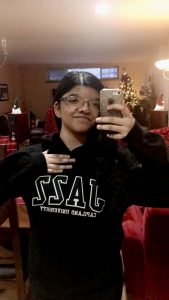
When I became an honorary member of the jazz studies program I got merchandise to make it official.
My Hard day Happy Place
Being in post secondary for the past few years, my stress, anxiety and frustration levels have increased, dropped and been fluctuating. Dealing with several other personal struggles including my physical health, my mental health has been hard for me to deal with and control. My education has always been something I strongly worry about. When having a variety of work to do by deadlines, at times that can affect both my mental and physical health, leading me to feel sick and the more physical side effects of anxiety. Having a place on my school campus that I know I can go and listen to music always makes me feel better and relaxed. The first floor of the Fir building is where the jazz program takes place on campus. That is where I always know I can go to feel better on a hard day. There was a day that I had fallen unconscious in class, I received help and medical attention but I had decided to sit out the rest of the class as I had felt so embarrassed and too anxious to return and sit down. I had told everyone I was just going to sit on the bench that was outside of the building that our class was in and get some fresh air. Sitting outside was not comfortable and I started stressing out about the class content I was missing. As I started to walk around I saw a few of my friends from the jazz studies program walking up to the FIr building with their instruments. I followed them into the building. I did not follow them into their class but I noticed that just walking through the hallway, and sitting on the bench I heard a variety of music being played. Just listening to what I could hear from the hallway I caught my breath and was able to stop shaking. A friend was going to practice for a private lesson coming up. I asked her if I could just sit inside the small room with her for just a few minutes and she agreed. Just sitting on the floor inside the room I just focused all of my attention to how beautiful the piano sounded. I felt like myself again and was not worried about who saw me or what class content I was missing by the second like I was twenty minutes earlier after my emergency in class. I felt so much more relaxed and decided if I was ever heavily tense, stressed and anxious I could just come down to the first floor of the Fir building and go for a walk through the halls, listen to any music being played and find any possible company. It was healing and therapeutic to me and so easy to find.
It has become commonly said and believed that listening to music is helpful when it comes to post-secondary students dealing with negativity due to school and their mental health. Various studies have shown positive effects and results when students listen to music, they feel a sense of relief. “The psychological energy of college students exists in the form of tension, and the sound of music also stimulates the appreciators in the form of tension. The two kinds of tension combine and influence each other” (Wang et al., 2022). This study reflects my experience with a large amount of stress and tension in university. I have found that music does affect my tension and that music does minimize the amount of tension and stress I am feeling. Others say they do feel a difference in the atmosphere and feel and see a difference in both their mood as well as others on the first floor of the Fir building as well. My psychology professor Dr.Alards-Tomalin says he enjoys it. “I love that kind of atmosphere and I think walking through the music area in the building and it always, I find it uplifting, you know, it’s the happy hallway. It is, it totally is. I think I like it, I always walk through it” (D. Alards-Tomalin, personal communication, March 13, 2023). I also spoke with Dr.Kofi Gbolonyo, a talented musician from Ghana, who is a jazz studies professor at Capilano University. He has played for students at the school as well as larger audiences and he says he can see the changes, lifts in their moods and emotions while playing, as well as his own. “I see changes in my own mood, and I see changes in people. I mean, audiences, people who are listening to me, people who are watching me, I see their mood changes. And guess what? Sometimes reading my audience’s moods changes helps me to adapt my level of performance” (K. Gbolonyo, personal communication, March 20, 2023). These comments do support my experiences with music making me feel better during rough times at school. When I know Dr.Gbolonyo has a class, workshop or performance at any time before or after an exam, presentation or any other stressful event I will try and make it to listen, and always leave feeling so much better, in a much better state of mind and a smile on my face.
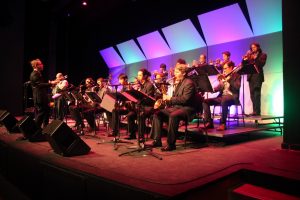
Before I had a role in the large ensemble concerts, I offered my services of photography to the program, and loved documenting the shows.
A Whole New Side of My Education
My favorite part about music and its ability to help me and my mental health is how it can distract me from my worrying, stress, negativity, and just pull all of my attention somewhere else. It can just grab all of my attention and help me focus it elsewhere. I have also benefited from using music as a form of therapy for myself in the past few years, I have gained an immense amount of knowledge about music itself. Not only the skills, but the history as well as music in different cultures. Sitting in various jazz studies program classes, watching friends practice instruments when I become so captivated, I always feel like I am in the class myself and just want to learn more, and I am pulled away from all of my own negative and stressful thoughts. The very first time I had heard of Dr.Kofi Gbolonyo’s African hand drumming workshops. I was still drowning in the stress of the three hour class I had just come out of. It was a cloudy gloomy day and I was feeling quite similar. I decided I just wanted to get a peek at what everyone was heading into and so interested in. I had no experience with hand drumming so my thoughts were I would not be allowed in. I was caught poking my head around the door, and Dr.Gbolonyo motioned for me to come join the circle and sit with a djembe drum that nobody was playing yet. I was shy but also excited. The professor had us playing drum patterns, singing songs and dancing with him the whole workshop. He also taught us many facts about the music and culture of Ghana, where he is from. It was all so fascinating to me. It brought me into an entirely different world from where I had felt in my own class earlier. I did not think twice about my personal struggles, academic stress and my spirits were lifted incredibly. I kept coming back to the drumming workshops, they felt like such a positive space to be and my mind would be completely distracted from any negativity happening. I’ve learned a lot about African music and how big of a role music plays in Ghanaian culture, including that hitting and playing the drum itself is seen as a healing method. Taking part in the workshops for a few years, I became better at African hand drumming and playing the djembe. Dr.Gbolonyo, or Kofi as he chooses to have his students call him, began teaching a large ensemble in the jazz studies program for the past two years. When I tried just coming in the class to just watch, he had me try and drum some patterns in the songs. It has led to him having me have a part in the band, joining every rehearsal and performing on stage in the regular semester shows in the school theater. Even details that were not musical such as the african costumes we would be wearing while performing, and the other instruments being used to add more of an African sound to our ensemble compared to the others, were all so interesting and just kept adding to my knowledge and interest, completely taking over my mind from where it would be if I was sitting myself alone and worried. To me, this was such a benefit. Despite not being in the jazz program, I was learning so much more than I thought I would be at school, it was very unexpected.
Several studies have been conducted to look at how and why music can be a distraction to a person or just grab their attention. There is a study that shows that if a track of music has captured one’s attention or brought them out of boredom then the track is aesthetically pleasing to the listener (Howlin et al., 2022). I agree, and feel this is similar to my experience with the jazz program. Before becoming a part of the jazz studies community, I was never involved with playing music and did not have much knowledge regarding many areas of it. Becoming closer with those involved and becoming more surrounded by it, music became more and more fascinating to me and would easily pull my attention away from what was often on my mind that would stress me out or make me nervous.
Before Kofi’s workshops, I was not very familiar with African music, and had never played a djembe before, once I began, in a way that became the priority and a main focus when I was around the jazz studies program or friends with the experience. When speaking with Kofi, he told me that, in his culture, music is never in isolation. Music in Ghanaian culture is dubbed a center which the community revolves around and survives on so a lot of people’s attention is easily put towards playing music, singing and dancing. It is shared with everyone in a community in a positive way (K. Gbolonyo, personal communication, March 20, 2023). I feel that this is why I was so easily enticed by the Ghanaian music as soon as I started the hand drumming workshops, and was able to gain a place in the band. The music has a natural pull to it, being open to having as many people as possible in it. It is knowledge like this I am grateful for, and would never have learned if I had not followed my interest in it.
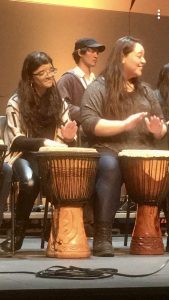
The first rehearsal on the stage before my first time performing on stage playing the djembe.
Feeling the Difference
Over the past five years, being surrounded by an immense amount of music and even included in the community, I believe I see and feel the difference it has made in my life physically and mentally, bringing so much light, positivity and joy. I do feel that being around, and listening to all of the music that I have been, I feel less stressed, more relaxed, social, connected with others, safe and much happier. A year ago, there was a night the band I participate in, C band, was performing a larger evening show in the theater on campus. There was a song that I got a small break in, and I just sat in my seat just looking around me and listening. Tears came to my eyes as I was taking in the lights, what I could see of the crowd, but most of all, my friends that were around me. They were playing their instruments beautifully, the music sounded so great and Kofi was conducting flawlessly, and I felt so good, so positive, so calm and grateful for the moment. I knew that all of what was happening at that moment was what helped me through so much.
“It is the way that people engage with music (e.g. focussed listening, self-reflection, meaning-making) that mediates the analgesic benefits of music listening” (Howlin et al., 2022). Many studies have led to the results that music has a healing factor. Music can lead to the secretion of neurotransmitters and hormones such as serotonin and dopamine that aid in decreasing pain and increasing stress relief, lifting one’s mood and behavior (Ettenberger et al., 2021). When asked if he’s seen a difference in me since I began playing music with him Kofi said “Absolutely. Yeah, Sarisha, I see you, uh, light up, really focus, really out of the glorious self, you, expressing that when you are in a music setting. Okay. Most importantly, when you are participating in it, you come out like, like the most glorious person. So, I can, I have no doubt that music helps you” (K. Gbolonyo, personal communication, March 20, 2023). Dr. Alards Tomalin also believes that being involved in the jazz studies program has helped me and I have helped them, “I would say the jazz program, you’ve contributed a lot to the jazz program and, uh, in kind they have also, you know, enriched your life too. So I don’t see it as a one-way thing. It’s definitely two, two ways” (D. Alards-Tomalin, personal communication, March 13, 2023). I felt joy hearing these comments and was happy to hear that others noticed a difference, the positivity and light that I felt when I was around music. The last day of the last spring semester I did not want to leave the campus, the first floor of the Fir building, being just made such a difference in my life and was so helpful. I was very sad the jazz studies department did not run courses over the summer semesters.
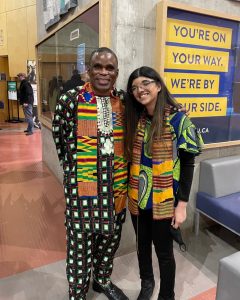
Me with Dr. Kofi Gbolonyo after a performance with Capilano University’s C band in which I played the djembe.
Musical Medication
In a psychology course I took, there was a day that we discussed a variety of less popular therapy methods. I learned more about music therapy, it increased my appreciation for music and those in the jazz studies program that were helping me by playing for me and including me in their program as many ways as possible. I became even more grateful that I had discovered a way to help myself without having to go on a variety of medical routes such as antidepressants or anxiety medications. I was glad to have help around me, even just through headphones when I needed it. I decided when it came to my mental health, I would want to try the methods without medication unless the medication became absolutely necessary. I knew things like just staying at school listening to my friends playing music when I was having a hard day was much easier and healthier for me. I have grown to believe that music therapy should be tried more before medication as it does have positive effects and helped me so much.
It has been proven that music makes a difference in mental health, very positive improvements. “It has been found that auditory stimulation can activate the secretion of serotonin” (Park et al., 2023). Music therapy has helped several people, increasing their levels of serotonin that interacts with the dopamine that helps control impulsive behavior and lowered levels of depression (Park et al., 2023). Many believe that music therapy is a strong form of treatment to those struggling with mental health. I definitely feel that. During the show I was performing with the C band this past month on March 3rd, I was slightly nervous as we had guests performing with the band on stage with us. However, once I got on stage, I did not feel any nerves or stress about anything, being surrounded by so many people, hearing music so loud and clear, I almost forgot I was playing a part in the songs as well, I felt so much joy. Our band leader and professor Kofi believes that music therapy is a great option for anyone struggling with mental health. When I asked him his opinion he responded “Absolutely. I would advocate for every non chemical intervention. By chemical, I mean use of medicine that people would take or inject or those things. Other, uh, yeah. Uh, other non medication approaches are used, okay. Until it becomes necessary, if it’s even necessary. While we are still using the chemical medical approach, we still should continue. We should never, ever stop the, uh, music therapeutic approach, okay? So that we will say that, well, we have tried a music therapeutic approach for the next three months. Well, it’s not helping as fast or as much as we want. So now we go, we’re going to go to the medication? Yes, let’s go to the medication. But let’s not completely stop and abandon the musical approach as well” (K. Gbolonyo, personal communication, March 20, 2023). His opinion is something I agree with and something I have been through myself. During my most recent hospital stay, I was staying in a bed and doing tests related to my physical health, and given medications. Despite reaching that level of treatment, I kept my phone that I used to listen to music and my headphones close. Hearing music and even watching videos of my friends playing music just made me so much more relaxed and took all of my nerves and stress away.
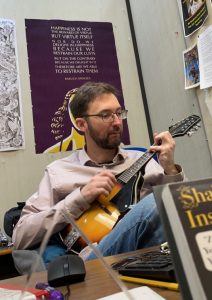
My professor Dr. Douglas Alards-Tomalin playing the mandolin during an office hours visit when I was having a stressful day.
Conclusion
Music has played such an important role in my life, especially in the past five years. It has been there for me when I was alone, brought me close with some of the most amazing friends and people I’ve ever known, taught me so much, and healed me in ways I never knew were possible. Looking back and reflecting has brought me even more joy and gratitude. I hope by sharing some of my experiences I can encourage others to try using music as their form of therapy before going down a more medical route. To try exploring a musical community, to try playing an instrument and see the differences it can make when they are not feeling their best. Finally I wanted to write on this topic also as an ode to my jazz family. Those who have been there for me these past few shakey years. Those who have let me join in anywhere and everywhere possible. I never believed I was musically talented and would be playing with a band on stage, but you all led me there. I hope more can experience that. There are no words to describe the fascination for the amount of knowledge I have learned about music in various ways. You all have made such a difference in my life, brought so much light and I will carry it all with me in my heart wherever I go. Thank you.
Works Cited
Ettenberger, M., Maya, R., Salgado-Vasco, A., Monsalve-Duarte, S., Betancourt-Zapata, W., Suarez-Cañon, N., Prieto-Garces, S., Marín-Sánchez, J., Gómez-Ortega, V., & Valderrama, M. (2021). The Effect of Music Therapy on Perceived Pain, Mental Health, Vital Signs, and Medication Usage of Burn Patients Hospitalized in the Intensive Care Unit: A Randomized Controlled Feasibility Study Protocol. Frontiers in Psychiatry, 12, 714209. https://doi.org/10.3389/fpsyt.2021.714209
Howlin, C., Stapleton, A., & Rooney, B. (2022). Tune out pain: Agency and active engagement predict decreases in pain intensity after music listening. PLOS ONE, 17(8), e0271329. https://doi.org/10.1371/journal.pone.0271329
Mitchell, E. (2021). Performing Identities and Performing Relationships: Community Music Therapy and Adolescent Mental Health. Music Therapy Perspectives. https://doi.org/10.1093/mtp/miab004
Park, J.-I., Lee, I.-H., Lee, S.-J., Kwon, R.-W., Choo, E.-A., Nam, H.-W., & Lee, J.-B. (2023). Effects of music therapy as an alternative treatment on depression in children and adolescents with ADHD by activating serotonin and improving stress coping ability. BMC Complementary Medicine and Therapies, 23(1). https://doi.org/10.1186/s12906-022-03832-6
Wang, T., Zhao, Y., & Yin, M. (2022). Research on Music influence based on Principal Component Analysis. Frontiers in Art Research, 13. https://doi.org/10.25236/far.2021.030202
Zheng, Q., & Lam, V. (2022). Influence of Multiple Music Styles and Composition Styles on College Students’ Mental Health. Occupational Therapy International, 2022, 1–21. https://doi.org/10.1155/2022/6167197
